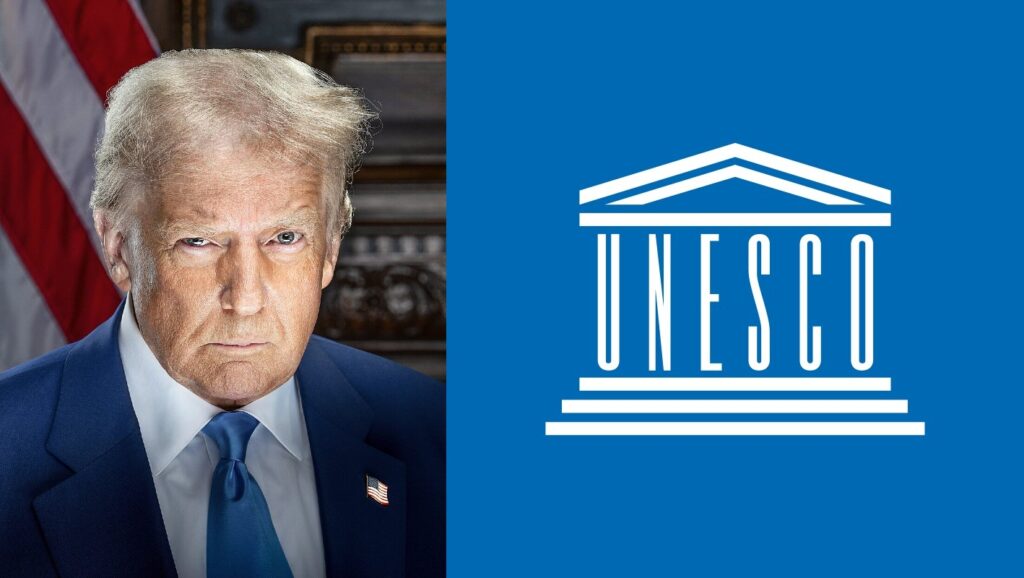
Washington – In a bold return to his “America First” doctrine, former President Donald Trump has officially announced that Trump to withdraw U.S. from UNESCO, reigniting international debate and domestic discussion on the role of multilateral organizations in American foreign policy.
The announcement, made at a campaign rally in Ohio and confirmed via an official statement released by Trump’s press office on July 21, 2025, declares that the United States will exit the United Nations Educational, Scientific and Cultural Organization (UNESCO) following a 90 day policy review that began in February. The decision to withdraw was based on what Trump called the agency’s “pro-China bias,” “pro-Palestinian agenda,” and an overemphasis on Diversity, Equity, and Inclusion (DEI) policies that he labels as part of a “globalist woke ideology.”
What Triggered the Withdrawal?
Trump’s decision to withdraw the U.S. from UNESCO comes amid growing right wing backlash against international organizations perceived to lean left ideologically. According to Trump, UNESCO’s initiatives on gender inclusivity, climate curriculum mandates, and cultural recognition of Palestinian heritage sites were key triggers.
“The United States will no longer support or fund an organization that has repeatedly demonstrated hostility towards our allies, promotes globalist propaganda, and undermines American sovereignty,” Trump said during his announcement. He further emphasized that his administration had “zero tolerance” for what he referred to as “woke indoctrination disguised as diplomacy.”
Not the First Exit from UNESCO
This is not the first time that a Trump administration has taken such action. During his first term, the Trump administration announced a similar decision in 2017, officially leaving UNESCO in 2018 over what it called “anti-Israel bias.” However, the Biden administration rejoined UNESCO in 2023, citing the need to counter growing Chinese influence in multilateral institutions.
The new decision to withdraw in 2025 signals not just a reversal of Biden era diplomacy but a full restoration of Trump’s isolationist stance in global politics.
Reactions from the International Community
Reactions from the international community were swift and critical. Audrey Azoulay, UNESCO’s Director-General, expressed “deep regret” over the decision, urging the United States to reconsider and engage in reform from within rather than abandoning its seat at the table.
Chinese state media has portrayed the withdrawal as an abdication of U.S. responsibility and a victory for China’s multilateral ambitions. Meanwhile, Israel expressed strong support for the move, with Prime Minister David Baruch calling it “a necessary stand against ideological extremism within global institutions.”
Domestic Political Response
Domestically, the decision has sharply divided lawmakers. Republicans hailed the move as a triumph for American sovereignty and conservative values. Senator Josh Hawley of Missouri stated, “UNESCO has become a playground for woke politics and anti-American rhetoric. Trump is right to pull us out.”
Democrats, however, warn that the decision could further isolate the United States and allow rivals like China and Russia to fill the vacuum. Senator Chris Murphy tweeted, “This isn’t leadership; it’s retreat. The vacuum we leave will be filled by those who don’t share our values.”
What Is at Stake?
The U.S. contributes tens of millions of dollars to UNESCO annually. These funds support global initiatives in education, cultural preservation, scientific collaboration, and press freedom. With Trump to withdraw U.S. from UNESCO, these contributions will cease unless Congress intervenes.
The departure also means the U.S. will lose its voting rights and leadership positions within the organization. UNESCO’s initiatives such as heritage site designations, climate change education, and pandemic response cooperation will now proceed without American input.
Strategic Implications: China Gains, U.S. Loses?
The strategic implications of Trump’s move are considerable. With the Trump to withdraw U.S. from UNESCO policy in place, Beijing may expand its soft power by filling the void left by Washington. Since rejoining UNESCO in 2020, China has steadily increased its influence through cultural diplomacy and technological cooperation programs.
Analysts warn that by disengaging from UNESCO, the U.S. risks ceding global leadership in areas that extend beyond politics education, science, and cultural development.
Conclusion
The announcement that Trump to withdraw U.S. from UNESCO marks yet another pivotal moment in U.S. foreign policy. It reflects a broader conservative pushback against global institutions and liberal values they are perceived to endorse. As Trump continues to campaign on promises of “taking back America,” this decision solidifies his stance as the leading anti-globalist voice on the world stage.
Whether the move benefits or harms American interests in the long term remains a hotly contested question, but one thing is clear: the U.S. is once again stepping back from the multilateral stage, leaving allies anxious and adversaries emboldened.
Sources: The New York Post and Pubity.
Stay connected with The News Drill for further updates.
















